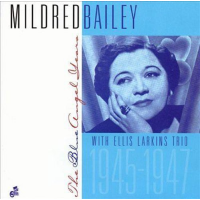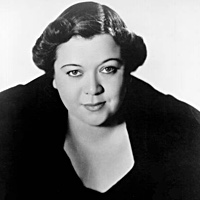Home » Jazz Musicians » Mildred Bailey
Mildred Bailey
Mildred Bailey was a popular American jazz singer during the 1930s.
Born as Mildred Rinker in Tekoa, Washington, Bailey retained the last name of her first husband, Ted Bailey, when she moved to Seattle to bolster her singing career. With the help of her second husband, Benny Stafford, she became an established blues and jazz singer on the west coast. In 1925 she secured work for her brother, Al Rinker and his partner Harry Lillis "Bing" Crosby. Crosby helped Bailey in turn by introducing her to Paul Whiteman. She sang with Paul Whiteman's band 1929 to 1933. In 1929, Whiteman had a popular radio program and when Bailey debuted with her version of "Moaning Low" in 1929, public reaction was immediate (although she didn't start making records with Whiteman until late 1931).
Her first two records were as uncredited vocalist for an Eddie Lang Orchestra session in 1929 ("What Kind O' Man Is You?", an obscure Hoagy Carmichael song) that was issued only the UK and a 1930 recording of "I Like To Do Things For You" for Frankie Trumbauer. She was Whiteman's popular female vocalist through 1932 (recording in a smooth crooning style), when she left the band due to salary disagreements. She then recorded a series of records for Brunswick in 1933 (accompanied by the Dorsey Brothers), as well an all-star session with Benny Goodman's studio band in 1934 that featured Coleman Hawkins.
In the mid 1930s, she recorded with her third husband Red Norvo. A dynamic couple, they earned the nicknames "Mr. and Mrs. Swing". During this period (from 1936-1939) Norvo recorded for Brunswick (with Bailey as primary vocalist) and Bailey recorded her own set of recordings for Vocalion, often with Norvo's band. Some of her recordings featured members of Count Basie's band. Despite her divorce from Red, she and her third husband would continue to record together in until 1945. Suffering from diabetes and depression (all during her adult life she was extremely heavy), she only made a few recordings following the Second World War. She died in Poughkeepsie, New York of heart failure, aged 44, chiefly due to her diabetes.
Jazz vocal collectors consider her one of the best Jazz vocalists of her era. Despite being a very big woman, Bailey had a sweet, rather small yet very expressive voice and quite a light, unique swinging vocal style. Many of the tunes she recorded were among the best versions recorded (good examples of this were "When Day Is Done" (1935), "'Long About Midnight" (1936), "Where Are You?", "Rockin' Chair", "It's The Natural Thing To Do" and "Bob White" (1937), and "Thanks For The Memory", "I Let A Song Go Out Of My Heart" and "Born To Swing" (1938).
Read moreTags
Mildred Bailey with the Ellis Larkins Trio: The Blue Angel Years 1945-1947

by Dave Nathan
In 1944 Mildred Bailey was getting back on track after the end of the disastrous recording ban which almost ruined her career as well as that of other performers of jazz and popular music. Fortunately, she was offered a radio show by CBS and when Max Gordon, who also had the Village Vanguard, opened his new Blue Angel jazz venue, Bailey signed on with a trio headed by a young pianist named Ellis Larkins. She remained there until 1947. Baldwin ...
Continue ReadingMildred Bailey: Queen of Swing

Source:
JazzWax by Marc Myers
In the 1930s, as the country struggled through the Depression, households buckled under the strain of poverty and the creeping fear of darkening world events. What kept most people from being swallowed by nagging pessimism and despair was the radio. The dramas and music that came over the airwaves provided much-needed relief from anxiety and worry. The first and finest female singing voice during these bleak years was Mildred Bailey. A warm and upbeat swing-era beacon, she not only forged ...
read more
Mosaic Records Presents The Complete Columbia Recordings of Mildred Bailey

Source:
All About Jazz
Mosaic Records Presents The Complete Columbia Recordings of Mildred Bailey - One of the Most Popular and Prolific Vocalists of the '30s
From the time Mildred Bailey joined Paul Whiteman's band in 1929, becoming the first prominent big band “girl singer," her crystal clear tone and impeccable phrasing made Bailey a major influence on both jazz and popular vocal styles. From her deep early impact on Bing Crosby to her strong influence on Frank Sinatra, Tony Bennett and Rosemary Clooney, ...
read more

































